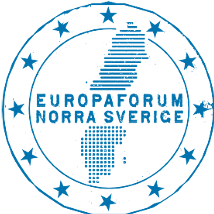Europaforum Norra Sverige (EFNS) is a network for politicians at the local and regional levels from Norrbotten, Västerbotten, Jämtland Härjedalen and Västernorrland. EFNS is a meeting place and knowledge arena where EU policies are analyzed and discussed as regards how they affect northern Sweden. EFNS monitors European issues to influence EU legislation, the EU’s strategies and action programs and the EU’s budget. The objective of EFNS is to safeguard the interests of northern Sweden both in the European arena and in relations to the national level in matters with a clear European perspective.
With this position paper we want to highlight the EU’s contribution to sustainable development of the Arctic through its role and funder and coordinator of Arctic research. We also want to suggest that:
- The EU-institutions apply a broader understanding of Arctic research to include – not just Polar research – but all applied and basic research activities that contributes to the sustainable development and the benefit of the people of the Arctic, such as bioeconomy, extractive industries, connectivity, health, indigenous issues, migration, atmospheric science and space ground infrastructure
- The EU highlight its contribution to the development of the Arctic through its ongoing research funding activities across the fields of intervention, in the context of the EU Arctic policy
- The people, businesses and research actors of the EU Arctic are recognized as key partners in tackling major challenges ahead with a sustainable approach in formulating and implementing policy in multi-level governance
Through its Arctic member states and through its power as a funder of research and innovation, the EU is an important actor in the quest for sustainable development of the Arctic. Science and innovation play a significant role to create stability, develop the businesses and industries of the region and deliver a great European added value, as shown in the OECD Territorial review on Northern Sparsely Populated Areas.1 The EU has taken an important role as a funder and coordinator of this research. However, a big share of the EU’s contributions to the Arctic remains unrecognized due to a far to narrow definition of “Arctic research” used in the practice of the European Commission services. The European Commission services often equals Arctic research with Polar research while in fact research projects across the whole Horizon 2020 field of intervention contributes to the Arctic. A recognition of a broader definition would help display the true value of the EU as an actor for development of the Arctic and would help directing research funding for the development of the Arctic.
In the report “Arctic research and innovation” of 20182 the EU reaffirms its dedication to Science and innovation as a force for continued development of the Arctic and lists the current EU funded projects under Horizon 2020 associated with the Arctic. The projects mentioned are in fact limited to polar research with research activities on climate impact where the methodology includes performed in the Arctic, foremost through vessel-based research. While these activities deliver vital research findings, this narrow scope risk losing the more holistic approach described in the joint communication “An integrated European Union policy for the Arctic” of 2016.3 As of 2018 there are 11 EU-funded projects that the European Commission services define as Arcticrelated and gathers them under the umbrella of the “EU Arctic cluster” to provide guidance and policy-relevant information.4 With such approach the perspective of the actors depending on the Arctic region for their research are heard but not the people, researchers and businesses of the EFNS.
The EU already invest substantially in research and innovation that helps develop the EFNSarea from a broader perspective in line with the ambitions outlined in the integrated European Union policy for the Arctic. That includes research in bioeconomy, extractive industries, business development, 5G, health, indigenous issues, migration, atmospheric science and space technology i.e. The Arctic region profits from the EU-funded activities under Horizon 2020 in these fields that today are not considered Arctic-related, both by research performed by actors within the region and elsewhere. With the narrow definition the efforts stand the risk of going unnoticed in terms of supporting the Arctic strategy. The profits with a joint strategy as a platform to coordinate efforts are lost when not all research fields are included in the implementation of the strategy.
Adopted by Europaforum North Sweden on May 8th 2020
Glenn Nordlund (S)
President EFNS Region Västernorrland
Åsa Ågren Wikström (M)
Vice president EFNS Region Västerbotten
Jonny Lundin (C)
Region Västernorrland
Erik Lövgren (S)
Kommunförbundet Västernorrland
Rickard Carstedt (S)
Region Västerbotten
Ann Åström (S)
Region Västerbotten
Nils-Olof Lindfors (C)
Region Norrbotten
Britta Flinkfeldt (S)
Norrbottens Kommuner
Anders Josefsson (M)
Norrbottens Kommuner
Elise Ryder Wikén (M)
Region Jämtland Härjedalen
Robert Uitto (S)
Region Jämtland Härjedalen
Thomas Andersson (C)
Region Jämtland Härjedalen
Daniel Danielsson (C)
Kommunerna i Jämtlands län
http://europarctic-research-in-the-european-union-context.pdf
